Lack of Diversity in Moderators Had Been Questioned
Columnists of Color More Likely to Say Walz Won
Matthew Lewis, Pulitzer-Winning Photographer, Dies at 94
Ta-Nehisi Coates Stirs Up Morning Television
NBC Helps Free Wrongfully Convicted Inmate
In Cuba, Military Is Tough Sell for Female J-Students
Short Takes: Joshua Johnson; our favorite sources for local news; Scripps Co., ABC layoffs; chauffeuring your interview subject; Adriana Diaz; $1 million Climate Crisis Journalist Protection Initiative; Chenue Her; new Hispanic-oriented radio in Orlando; banning legacy admissions preferences; Jada Gomez;
Remains of Indigenous boarding school children; Al Jazeera’s Ramallah bureau; Palestinian journalist retains Emmy; shutdown of Nicaragua’s independent journalists; arrest of leading voice in Cambodia; Nigerian journalists charged; appeal by 500 Sahel radio stations.
Homepage photo: Boston Globe Opinion writers weigh in on the Vance-Walz debate. (Credit: Karissa Korman)
Support Journal-isms(Credit: CBS/YouTube)
Lack of Diversity in Moderators Had Been Questioned
The day before Tuesday’s vice presidential debate, Brandon Tensley of the nonprofit news site Capital B wrote, “Minnesota Gov. Tim Walz and U.S. Sen. JD Vance of Ohio couldn’t be more different when it comes to the issues that matter to many Black voters — and Tuesday night’s vice presidential debate will likely be the final opportunity for their ideologies to take center stage.”
It didn’t happen. The headline on Tinsley’s post-debate piece was, “VP Debate Fact Check: A Failed Chance to Grill Candidates on Racial Inequality.”
Last month, the NAACP released a poll of Black Americans and concluded, “Over half of Black voters say the highest priority for our elected leaders should be protecting our rights and freedoms (53%), compared to addressing economic concerns (40%), and addressing other issues (7%).”
And who can forget ABC News’ Rachel Scott’s opening question to former president Donald Trump at the National Association of Black Journalists convention this summer?:
Scott listed remarks Trump had made to or about Black people and noted that he had dined with a white supremacist, Nick Fuentes.
“So my question, sir, now that you are asking Black supporters to vote for you, why should Black voters trust you after you have used language like that?” Scott asked Trump.
Trump replied that that was a “nasty” question, even though most observers thought it was Trump who was nasty. And according to The Root, Black Twitter felt nastiness can’t be countered with niceness.
“Folks tuned in expecting Vance to be Trump’s attack dog and be as brazen and disrespectful as he has been in past interviews. Instead, he traded that in for a calmer, more civil demeanor that no one was expecting,” Candace McDuffie wrote Wednesday. “But unlike Kamala Harris during her debate with Trump, Walz put on the kid gloves when debating Vance when many believed it should have been the total opposite.
“If Black Twitter truly is a reflection of how we feel, then Black folks were not feeling Walz.”
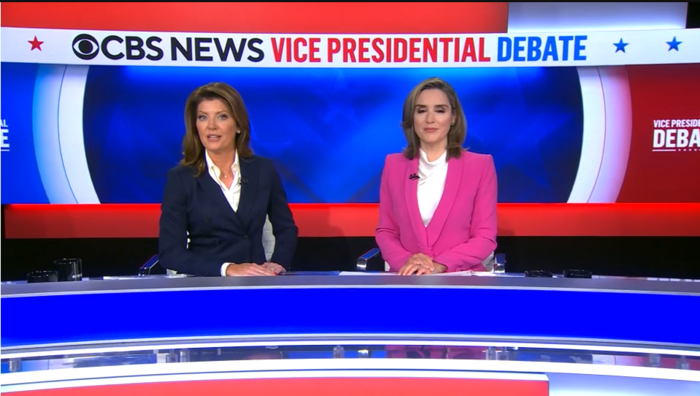
Screenshot of debate moderators Norah O’Donnell, left, and Margaret Brennan. (Credit: CBS)
In August, the National Association of Hispanic Journalists, in a statement endorsed by the Asian American Journalists Association and the Indigenous Journalists Association, called for diversity among the questioners. The vice presidential debate was moderated by Norah O’Donnell and Margaret Brennan, two white women.
NAHJ said, “The presidential and vice presidential debates of 2024 feature only one journalist of color among six moderators, a failure of leadership that network news still has time to address. . . .
“The moderators selected thus far are all excellent journalists,” the NAHJ statement said, “but having a variety of backgrounds represented results in higher-quality journalism. The perspectives and experiences of journalists of color can ensure they pose questions that resonate with broader audiences. Instead, network and cable news networks are implicitly signaling that when the stakes are highest, white journalists are most likely to get the call.
“There is still time to remedy the situation. ABC News, which is hosting the next presidential debate on Sept. 10, and CBS News, which is hosting the VP candidates on Oct. 1, can each add an additional moderator, as networks did during primary debates. They can also structure the debates to ensure candidates get questions from diverse audience members, including local journalists.” ABC News‘ Linsey Davis, a Black woman, co-moderated the Trump-Harris debate Sept. 10.
Unlike that faceoff, BET and theGrio TV, which both target African American viewers, did not simulcast the vice presidential debate.
But commentators of color on other networks had their say. On MSNBC, Joy Reid noted what became the chief takeaway of the night, Vance “really can’t say Donald Trump lost the election.”
Vance also “repeatedly lied about Springfield,” where Vance said Haitian migrants were eating dogs and cats in the Ohio city, “and had to have his mic muted.”
On CNN, Van Jones said “JD Vance changes personalities like some people change suits. He lied the entire night.”
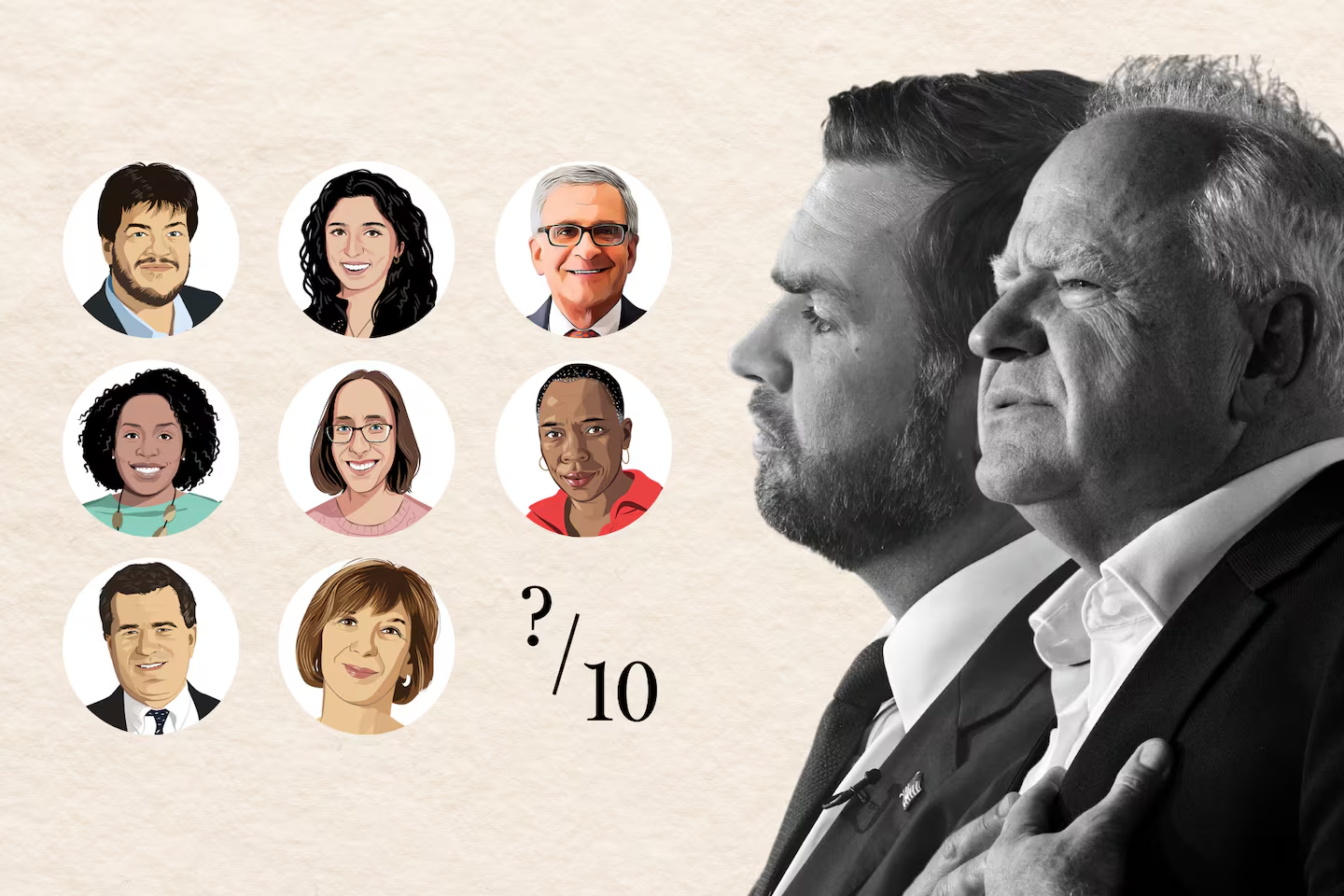
Three of the Boston Globe opinion writers (Carine Hajjar, Joan Vennochi and Jeff Jacoby) gave the debate to JD Vance, three others to Tim Walz (Renée Graham, Kimberly Atkins Stohr and Scot Lehigh) and two more (Shira Schoenberg and David Shribman) said it was a tie. (Credit: Karissa Korman/Boston Globe)
Columnists of Color More Likely to Say Walz Won
The opinion editors at The New York Times, Boston Globe, and Philadelphia Inquirer asked opinion writers Tuesday night to evaluate the vice presidential debate.
Here are excerpts from the replies of the commentators of color:
Jenice Armstrong, Philadelphia Inquirer columnist, on Vance, asked to rank his performance from 1 to 10. “He’s a good talker all right. But what I’m going to remember about this debate is that Vance got asked about the 2020 presidential election and he refused to admit that Trump lost. He knows he did, but isn’t honest enough to be truthful with the American public. (4/10)”
Charles M. Blow, New York Times columnist: “Walz won. You could tell that he was a teacher, because he clearly did his homework. Anyone afraid that Vance would roll over him could breathe easily. Vance seemed to have been told not to come across as a condescending valedictorian. But he might have heeded that advice too well. Vance’s performance was anemic. Also, he had to contort himself to dodge Donald Trump’s statements and his own past statements.”
Jamelle Bouie, New York Times columnist: “It’s a pretty straightforward verdict: Vance won this debate. It’s not hard to see why. He has spent most of his adult life selling himself to the wealthy, the powerful and the influential. He is as smooth and practiced as they come. He has no regard for the truth. He lies as easily as he breathes. We saw this throughout the debate. He told Americans that there are 20 million to 25 million ‘illegal aliens’ — a lie. He told Americans that Mexico is responsible for the nation’s illegal gun problem — a lie. He told Americans that Trump actually tried to save the Affordable Care Act — a lie. If Vance had to sell the benefits of asbestos to win office, he would do it well and do it with a smile.”
Luis Carrasco, Philadelphia Inquirer deputy opinion editor: “Vance misrepresented, misdirected, and straight out lied, yet he sounded so certain, so civil, and measured — and was so rarely held to account — that he walked away with the debate. For anyone who wondered what Trump’s politics of cruelty will look like without Trump, it was a stomach-turning performance by a smiler with the knife. (8/10)”
Jane Coaston, contributing New York Times Opinion writer: “Vance seemed smoother and more practiced, but ‘won’ is a very strong term here.”
Renee Graham, Boston Globe columnist: “Some of the most notable quotes from the JD Vance-Tim Walz vice presidential debate:
‘” ‘That is a damning non-answer’: JD Vance refuses to say Donald Trump lost the 2020 election; VP debate takeaways: Vance and Walz keep it civil in a policy-heavy discussion
JD Vance: 2; Tim Walz: 7
“In true Trumpian fashion, Senator JD Vance of Ohio treated questions from the vice presidential debate’s moderators, Norah O’Donnell and Margaret Brennan, like an electrified third rail — he avoided them entirely. Whenever he said ‘Before we talk about…’ whatever subject was raised, that was a signal that he wouldn’t talk about that subject at all. Governor Tim Walz of Minnesota had a shaky start — his nervousness showed — but he got his bearings until he was asked about discrepancies in his story about being in China during China’s Tiananmen Square uprising and massacre. His answer was as solid as quicksand, and Walz, who’s already had to explain himself too many times concerning details about his life, did himself no favors.
“But at least Walz came across as genuine, especially when talking about reproductive rights, a cornerstone of Vice President Kamala Harris’s campaign. Vance can’t evade his own smarminess for his shifting opinions on Donald Trump, a man he once compared to Adolf Hitler but now upholds as the savior of America and the world. No matter how many times Vance evoked his tough childhood to seem relatable, he kept tripping over his two greatest liabilities — his running mate and his own mouth.”
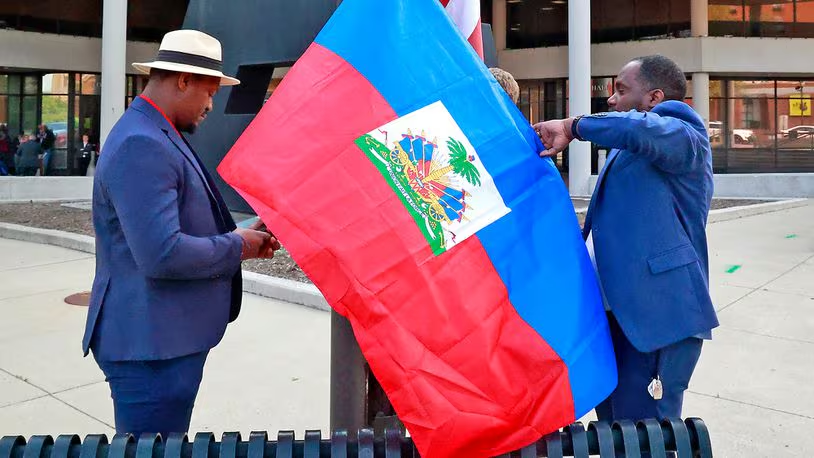
Miguelito Jerome, left, and Luckens Merzius raise the Haitian flag on May 1, 2023, in front of Springfield, Ohio, city hall. The ceremony marked the beginning of Flag Day in Haiti and recognized the growing number of Haitians in the city. Sen. DJ Vance incorrectly said “Kamala Harris’ open border” has “destroyed” the lives of American citizens in Springfield before debate moderators cut off his mic. However, Vance’s repeated statements that the vice president led the administration, not the president, went unchallenged. (Credit: Bill Lackey/Springfield News-Sun)
Solomon Jones, Inquirer contributing columnist: “JD Vance sounded almost reasonable. He emphasized the points where he and Walz agreed, and dodged questions with the skill of a matador. He was asked about reproductive rights and talked about growing up in a working class neighborhood. He was asked about how migrants increase housing prices and referred viewers to a study that would be posted online. He was asked about Trump’s ‘concepts of a plan’ and claimed that Trump was all about better health care. But when Walz asked him if Trump lost the 2020 election and Vance dodged that question, Walz said, ‘That was a damning non-answer.’ I agree with Walz, and if you believe in democracy, you should, too. (5/10)”
Farah Stockman, member, New York Times editorial board: I’d call it a tie. Vance did an excellent job of impersonating a decent man. Walz flubbed a number of answers — and dodged a question about whether he lied about being in China during the Tiananmen protests in 1989. But he recovered.
Kimberly Atkins Stohr, Boston Globe columnist: “Vance: 1; Walz: 6
“Governor Tim Walz gets bonus points because the job of fact-checking Senator JD Vance was unfairly put on his shoulders instead of on the moderators. But Walz started off shaky and nervous, missing several opportunities to lay bare Vance’s lies – even about the horrible impact of Vance’s dangerous rhetoric on his own constituents in Springfield, Ohio. But Walz got his bearings by the time the debate turned to the issue of reproductive rights, highlighting the deadly horrors that have resulted from overturning Roe v. Wade, and fact-checking Donald Trump’s lies about sending the issue back to the states. His answer on the need for sensible gun laws to protect kids in schools was his best answer of the night.
“Vance was the smoother talker of the two, but that doesn’t matter when he’s largely either lying (for example, 320,000 unaccompanied migrant children were not ‘lost,’ and he supports using the Comstock Act to restrict abortions nationally) or sane-washing Trump (calling his decimation of reproduction rights ‘pro-family’ and his shockingly reckless foreign policy ‘stable.’) His admission that he doesn’t care about migrants legally living, working, and contributing to the fabric of American communities while refusing to take accountability for the chaos his racist lies created in Springfield are disqualifying.”
Helen Ubiñas, columnist, Philadelphia Inquirer: “You know what, I’m done playing this game … we should all be done playing this presidential political horse race game. Who cares if JD Vance at times played the part of a thoughtful, tolerant, unbiased, evolved American citizen. This isn’t a pageant or the Emmys, so, no, Vance will not be getting the Outstanding Supporting Actor in a Dystopian Drama Award tonight. He is a slick, shape-shifting sycophant who once (rightly) called Trump a ‘moral disaster’ and compared him to Hitler. Being able to better deliver the same kind of dangerous lies as Trump just makes him potentially more dangerous. He refused to admit that Trump lost the election. That’s it. That’s all we need to know to say: No. Never Trump (again) and Never Vance. (1/10)”
Sabrina Vourvoulias, Philadelphia senior editor for commentary, ideas, and community engagement: “I wish I could give him a zero because the man lies and lies and lies — and when he isn’t lying, he’s saying reprehensible things (usually about immigrants). Unfortunately, he’s very slick, and so much better spoken than Trump that he makes their egregious distortions of fact sound almost palatable. IMO, that makes him even more dangerous than Trump. (5/10)”
- Halimah Abdullah, Capital B: How Haitian Immigrants Are Fighting Back Against Trump and Vance’s Smears
- Jon Allsop, Columbia Journalism Review: J.D. Vance’s kangaroo court
- Associated Press: FACT FOCUS: A look at false and misleading claims during the vice presidential debate
- Hayes Brown, MSNBC: Vance’s Republican Party sounds pretty nice. Too bad it’s fantasy.
- Stacy M. Brown, National Newspaper Publishers Association: Vance and Walz Begin Cordially but End in Heated Clashes Over Trump, Jan. 6, and National Policy Issues
- Christina Carrega, Capital B: How Trump-Appointed Judges Are Devastating Black Communities
- Tommy Christopher, Mediaite: CNN’s Jim Acosta Shuts Down Trump Chief Lewandowski After He Refuses To Correctly Pronounce ‘Kamala’
- Committee to Protect Journalists: US press freedom under unprecedented pressure ahead of election, CPJ report finds
- Mary C. Curtis, Roll Call: Stoking division may be a winning campaign strategy, but it comes at a cost
- Ariel Edwards-Levy and Jennifer Agiesta, CNN: CNN Instant Poll: No clear winner in VP debate between Tim Walz and JD Vance
- Michael M. Grynbaum, New York Times: CBS Sought the Middle Ground on Fact-Checking. Vance Jumped Into the Gap.
- Michael Harriot, theGrio: JD Vance vs. Tim Walz is the new Drake vs. Kendrick Lamar
- Roy S. Johnson, al.com: Check your heart, folks, before spewing ‘Willie’ Horton-like deceit about Haitians
- Sam Levine, the Guardian: What price are US media outlets paying for spreading election lies?
- Media Matters for America: Following the VP debate, Morning Joe calls out the media for its “flattening of moral equivalency” in covering the Trump campaign
- Nicolas Niarchos, New York Times: H.R. McMaster Doesn’t Think Donald Trump Is Very Good at Making Deals: A new memoir by the onetime national security adviser shows how the former president’s insecurities and weaknesses harmed U.S. foreign policy.
- Zachary Pleat, Media Matters for America: Broadcast news ignored JD Vance’s promise to gut the Affordable Care Act and imperil millions with pre-existing conditions
- April Ryan, theGrio: Watch: Black immigrant advocate has a message for Harris-Walz campaign
- Rob Tornoe, Editor & Publisher: The ‘sanewashing’ phenomenon
-
Yvette Walker, Kansas City Star: First and only VP debate was too nice. Wait, isn’t that the way it’s supposed to be?
- Benjamin Wallace-Wells, New Yorker: J. D. Vance Got the Conversation He Wanted at the Vice-Presidential Debate
- Juan Williams, The Hill: Mark Robinson, the real-life Clayton Bigsby, makes a mockery of Black conservatives
In this 2011 video from Our State magazine in North Carolina, Matthew Lewis talks about one of his favorite photographs and his life’s work. Video produced for Our State by Jonathan Weaver. (Credit: YouTube)
Matthew Lewis, Pulitzer-Winning Photographer, Dies at 94
“Matthew Lewis, a Washington Post photographer who won the Pulitzer Prize for his portfolio of Washington-area personalities and ways of life and who became the newspaper’s first Black assistant managing editor, died Oct. 2 at his home in Thomasville, N.C. He was 94,” Adam Bernstein reported Thursday for the Post.
“The cause was complications from a fall, said his son Kevin Lewis, the fourth generation of his family to work in photography.
“Mr. Lewis’s grandfather had a studio specializing in portraits, and his father was a sports photographer and photo engraver for the Pittsburgh Courier, at the time one of the most influential Black newspapers in the country. But Mr. Lewis initially had little interest in continuing the pictorial tradition.
“He studied jazz saxophone, drove a cab, was a Navy medic, worked in a foundry sandblasting steel and was an audiovisual assistant for eight years at Morgan State, a historically Black college and later university in Baltimore. He was 33 by the time he began working as a freelance photographer for Black newspapers, covering the August 1963 March on Washington and President John F. Kennedy’s funeral that November.
“The Washington Post hired Mr. Lewis in 1965, four years after Ellsworth J. Davis became the paper’s first Black photographer. They were part of a small coterie of Black journalists at The Post that included reporters Luther P. Jackson Jr. and Dorothy Butler Gilliam. ‘When I first started, I was very fortunate to get a job as an African American,’ Mr. Lewis said. ‘Work ethic was very important and vital where I come from.’
“Over the next decade, Mr. Lewis deeply involved himself in coverage that encompassed a child’s first day of school to the police crackdowns against protesters at the 1968 Democratic National Convention in Chicago. That February, he photographed the Rev. Martin Luther King Jr. speaking from the pulpit of Washington’s Vermont Avenue Baptist Church six weeks before the civil rights leader was assassinated in Memphis. . . . “
Akili-Casundria Ramsess, executive director of the National Press Photographers Association, messaged Journal-isms Thursday, “He was a trailblazer and was instrumental in bringing on future award-winning African-American photojournalists like Fred Sweets, Craig Herndon and Dudley Brooks to the Washington Post. I never had the honor of meeting him but his career was an inspiration to me on the importance of having a Black voice in a leadership position in the newsroom. “
Ta-Nehisi Coates joins “CBS Mornings” to talk about his new book, “The Message,” and about the banning of his work in South Carolina. (Credit: YouTube)
Ta-Nehisi Coates Stirs Up Morning Television
“The cozy world of morning television was stirred up Monday by an unusually tense and substantive discussion of a volatile issue, between author Ta-Nehisi Coates and ‘CBS Mornings’ host Tony Dokoupil. The subjects: Israel and the Palestinian people,” Will Sommer reported Tuesday for The Washington Post.
“Coates appeared on the CBS morning show to promote his new book, ‘The Message,’ which includes a section about Coates’s trip to the Israeli-occupied West Bank, and how this experience informs his criticism of ‘apartheid’ in Israel.
“Dokoupil suggested that Coates’s book reads like the work of an extremist. . . .
“The resulting conversation was impassioned but calm, heartfelt but brief. CBS and Coates — a celebrated thinker and author of books such as ‘Between the World and Me’ — did not immediately respond to a request for additional comment.
On the show, Coates responded that Israel’s perspective is well-represented in mainstream American media while he struggled to find Palestinian voices and wanted to elevate them in his book.
“ ‘I wrote a 260-page book,’ Coates said. ‘It is not a treatise on the entirety of the conflict between the Palestinians and the Israelis.’ ”
Zack Linly wrote Tuesday for BlackAmericaWeb,com, “CBS Mornings co-host Tony Dokoupil served as a reminder of how white journalists have historically treated Black intellectuals, particularly those who refuse to help perpetuate views that have already been given plenty of air time in mainstream media. . .. “
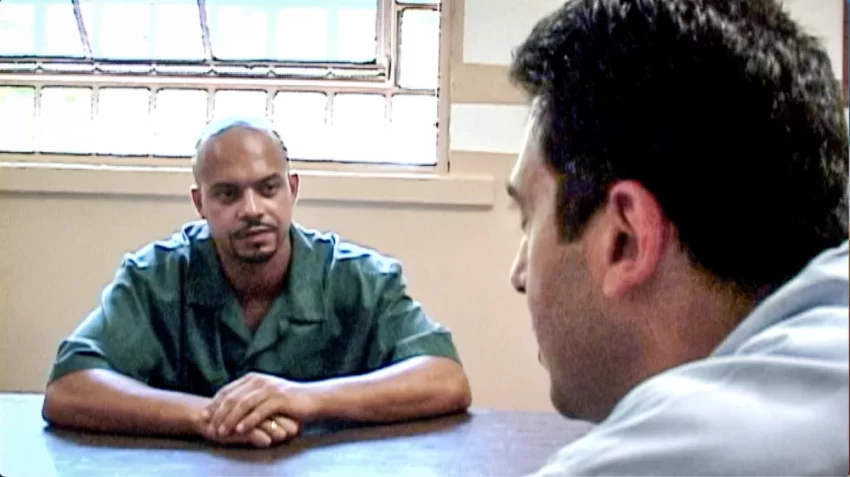
Dan Slepian interviews Jon-Adrian Velazquez at the Sing Sing Correctional Facility in 2007. (Credit: Dateline)
NBC Helps Free Wrongfully Convicted Inmate
“Jon-Adrian ‘JJ’ Velazquez was exonerated in court on Monday after serving a 25-years-to-life sentence at Sing-Sing prison in New York for the murder of a retired police officer,” Philip Marcelo reported Monday for the Associated Press.
“But Velazquez said he also wondered if he was free only because of the notoriety of his case, which has been the subject of a documentary, podcasts, a movie and a book.
According to a podcast posting last year from NBC, “In December of 2002, NBC News producer Dan Slepian got a letter from a New York state prison. It was from a man serving 25 years to life for murder. And it ended with a desperate plea: look into my case.
“Jon-Adrian ‘JJ’ Velazquez had been convicted of killing a retired New York City police officer, but he insisted he didn’t do it. Dan was skeptical. Prosecutors said five eyewitnesses had sworn JJ was the killer. Could five people be wrong? Letters from Sing Sing tells the story of a man convicted of murder, a journalist, and the letter that changed both of their lives. . . .”
Velazguez said Monday, “ ‘We should not have a system where it’s so much easier to imprison the poor than it is to free the innocent. ‘It has always been this way, but it doesn’t have to be, because we deserve better.’
“The judge’s order came after Manhattan District Attorney Alvin Bragg’s office joined in Velazquez’s request to vacate the conviction.. . .
“Velazquez’s efforts to get his conviction tossed were boosted by ‘West Wing’ and ‘Apocalypse Now’ star Martin Sheen, who held a press conference spotlighting the case in 2011. NBC’s ‘Dateline’ also examined it in 2012.
“While behind bars, Velazquez earned a bachelor’s degree, worked as a teaching fellow for a Columbia University professor and enlisted fellow inmates in launching gun violence prevention, youth mentorship and other programs.
“He also helped other inmates appeal their convictions — work he has continued since his release.”
Hota Kotb Exit Could Signal Big Changes
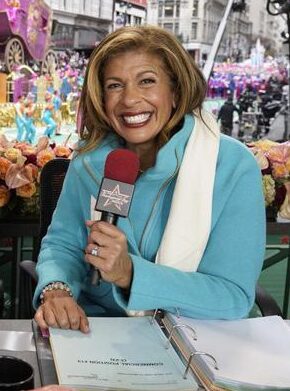 “Hoda Kotb‘s (pictured) looming exit from NBC‘s Today show is arguably the biggest change to the morning show lineups in years, and the network will have a tall task to not only fill the anchor chairs on two very different shows (the two core hours of Today and the separate 10 a.m. hour), but also decide how they want to show to look and feel,” Alex Weprin reported Sept. 27 for the Hollywood Reporter. “Kotb will shift to a new role at NBC News sometime in 2025.
“Hoda Kotb‘s (pictured) looming exit from NBC‘s Today show is arguably the biggest change to the morning show lineups in years, and the network will have a tall task to not only fill the anchor chairs on two very different shows (the two core hours of Today and the separate 10 a.m. hour), but also decide how they want to show to look and feel,” Alex Weprin reported Sept. 27 for the Hollywood Reporter. “Kotb will shift to a new role at NBC News sometime in 2025.
“Kotb’s exit early next year will force NBC to decide how it wants to move forward.
“It’s worth noting that Today is the last network morning show to have two lead co-anchors, with both ABC and CBS switching to a three-anchor setup (again, all the shows have a larger supporting cast including weather anchors, news anchors and other contributors).
“NBC may very well use her exit to change the format to a three-anchor setup as well. Today meteorologist Dylan Dreyer told E! Thursday evening that ‘I don’t think if they named anyone in our core group of people it would be surprising … We’ve all filled in along the way when somebody’s out.’
“While that’s true, some internally at NBC view Craig Melvin, who has been with the show for six years, as all but certain to be a part of whatever format the show moves forward with. . . .”
Kotb was born to Egyptian Muslim parents in Norman, Okla.
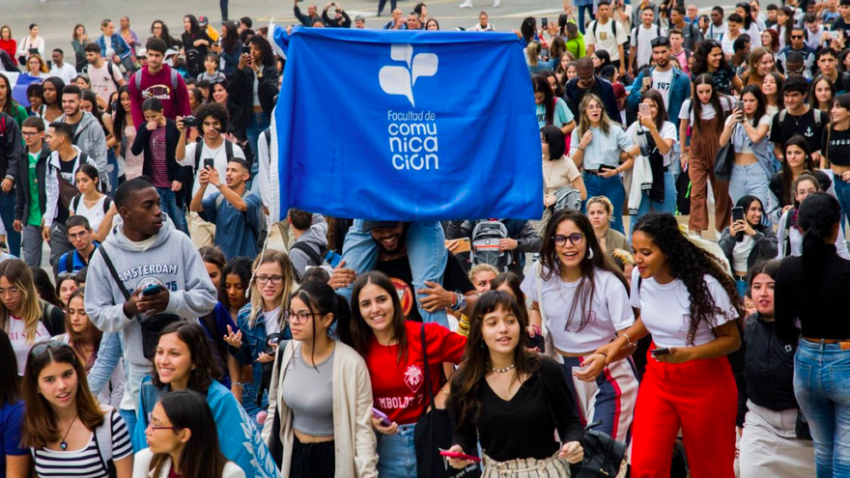
A group of journalism students with the flag of the Faculty of Communication of the University of Havana. (Facebook/Faculty of Communication, University of Havana)
In Cuba, Military Is Tough Sell for Female J-Students
By Julio Antonio Rojas
The journalism course at the University of Havana began with only 14 students seeking a bachelor’s degree in the profession.
At the end of January, it was reported that young Cuban women who choose to study for a bachelor’s degree in journalism must complete a year of mandatory military service beforehand, CiberCuba told readers Aug. 27. “The measure will come into effect starting the 2024-2025 academic year.”
For Ariel Terrero, dean of the Faculty of Communication of the University of Havana, the implementation of this military service condition for women is “a failure.” He questions whether active military service really serves to “educate and ideologically form these young women.” It was already a requirement for men.
José Raúl Gallego, a former university professor, told the independent Diario De Cuba that “the image of the journalist in society has been greatly damaged.” After the expansion of the internet, the “information monopoly of the dictatorship” was broken, which makes Cuban readers consume and contrast information through other sources.
José Luis Tan Estrada, a former teacher expelled from the University of Camagüey for his political ideas, added, “the demotivation, the low wages, emigration, lack of resources” and in a marked way censorship are among
other factors that could influence the lack of interest in journalism as a career.”
The crisis of this specialty has been brewing for decades. Each year, some graduates end up not practicing the profession, emigrate or move to independent journalism.
This is the case of “Lili” and “Manuel,” names changed to avoid reprisals, who are part of a recent batch of departures from the Faculty of Communication at the University of Havana. “Lili” pleaded she had a health problem;
“Manuel” worked for just a few months in a radio station and asked out.
When “Lili” is asked if she would have gone to military service to be able to study journalism, she lets out a laugh: “Not crazy, I prefer to sweep streets.”
It took “Manuel” less than half a year on Cuban radio to understand the restrictions. A couple of reports that he prepared with testimonies collected on the streets were never broadcast. “The editors were dragging their feet, but
it was evident that the complaints of the interviewees about the situation in the country did not please them.”
Now, the young man publishes under a pseudonym for an independent media outlet while waiting for humanitarian parole through his father, a resident of the United States.
“I don’t want to complicate myself working in an official media outlet lest I have trouble leaving.”
“Lili,” now recovered from her illness, writes weekly horoscope texts for a digital site outside Cuba that pays by piecework and in dollars.
Julio Antonio Rojas reports from Havana.
[Friday update from Nora Gámez Torres in the Miami Herald:
“Several new laws and decrees punish posting criticism of the government, communism or Cuban leaders online or in a media outlet. Starting Friday, all media outlets in the country must also seek formal government approval to continue working, according to a new Social Communication law. Foreign media outlets are doing so. But independent media outlets have been operating in a gray zone because there was no written legislation banning them, although their journalists have been frequently harassed, arrested or forced into exile.” . . .
[“In an editorial Thursday, Cubanet said that several of its journalists on the island were threatened with long prison sentences or with repercussions for their relatives. In the editorial, Cubanet said state security officials seized personal belongings owned by the journalists. . . .”]
- Committee to Protect Journalists: Journalist Yeris Curbelo Aguilera sentenced to 2 years in prison in Cuba (video en Espanol)
- Julio Antonio Rojas, Journal-isms: Cuba Cracks Down on Smugglers of U.S. News (Sept. 23) (scroll down)
Short Takes
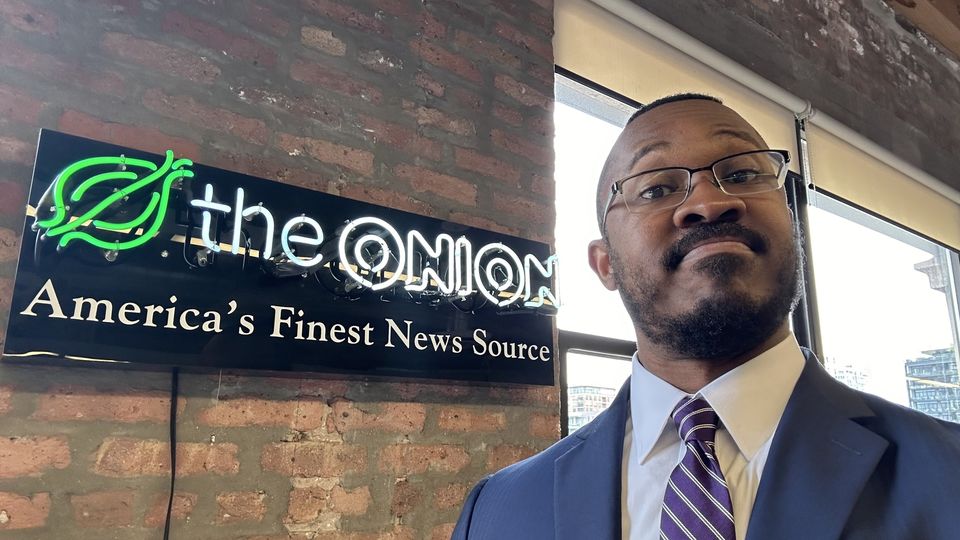 “Comedy news outlet the Onion — reinvigorated by new ownership over this year — is bringing back its once-popular video parodies of cable news. But this time, there’s someone with real news anchor experience in the chair,” Will Sommer reported Monday for The Washington Post. “When the first episodes appear online Monday, former WAMU and MSNBC host Joshua Johnson (pictured) will be the face of the resurrected “Onion News Network.” Playing an ONN anchor character named Dwight Richmond, Johnson says he’s bringing a real anchor’s sense of clarity — and self-importance — to the job. . . .” Video
“Comedy news outlet the Onion — reinvigorated by new ownership over this year — is bringing back its once-popular video parodies of cable news. But this time, there’s someone with real news anchor experience in the chair,” Will Sommer reported Monday for The Washington Post. “When the first episodes appear online Monday, former WAMU and MSNBC host Joshua Johnson (pictured) will be the face of the resurrected “Onion News Network.” Playing an ONN anchor character named Dwight Richmond, Johnson says he’s bringing a real anchor’s sense of clarity — and self-importance — to the job. . . .” Video
- “Americans’ relationship with local news is changing. More are getting news online, and fewer are turning to sources like daily newspapers, according to a Pew Research Center survey conducted earlier this year . . . ,” Elisa Shearer reported Sept 26 for Pew. “However, one thing that has remained consistent is the importance of friends, family and neighbors as sources of local news for most Americans. In fact, they are the most common source of local news we asked about, ranking above television stations, radio stations and online forums like Facebook groups. . . .”
- “The E.W. Scripps Co. is eliminating more than 200 jobs and will ‘wind down’ its national news programming, as the company cites an adverse advertising environment,” Ted Johnson reported Sept. 27 for Deadline. “In a memo to employees, CEO Adam Symson wrote that Scripps News will no longer be broadcast over the air, but will remain on streaming and digital platforms with reporting from the field. A core reporting team will continue to be based in Washington, D.C. to serve local stations. . . .” Meanwhile, ABC News will reportedly be parting ways with 75 staffers,” Mark Mwachiro reported Wednesday for Adweek.
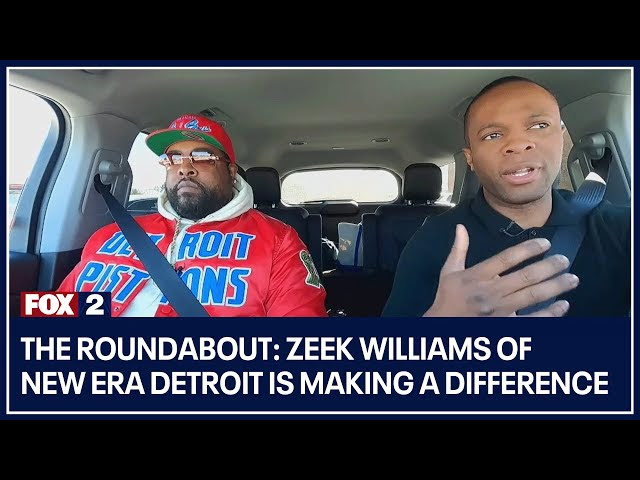
- “Brandon Hudson, an anchor and reporter at WJBK, Fox 2 in Detroit, says he finds some people are more comfortable talking while they sit shotgun in a car. More so than a one-on-one interview in the studio or on a Zoom call,” Paul Greeley reported Sept. 27 for the subscription-only NewsBlues site. ” ‘Overall, it definitely lets their guard down,’ he says. . . .”
(Credit: CBS)
The third hour of “CBS Mornings,” known as “CBS Mornings Plus,” launched Sept. 30, with Tony Dokoupil and Adriana Diaz co-hosting. The program is to air 9-10 a.m. ET weekdays on CBS-owned stations in Los Angeles, Chicago, San Francisco, Detroit and Miami, and simulcast on streaming network CBS News 24/7.
-
- The Committee to Protect Journalists announced a Climate Crisis Journalist Protection Initiative, “which will ensure that journalists reporting on climate issues are able to do so freely and safely. The initiative will provide climate journalists with assistance, safety training, and other forms of support,” the organization said Sept. 23. “CPJ has raised nearly one-third of the funds needed for the $1 million dollar initiative, which CPJ CEO Jodie Ginsberg unveiled today at the 2024 Clinton Global Initiative meeting. The annual meeting is a venue for civil society groups to publicly commit to action on global problems. . . . “
-
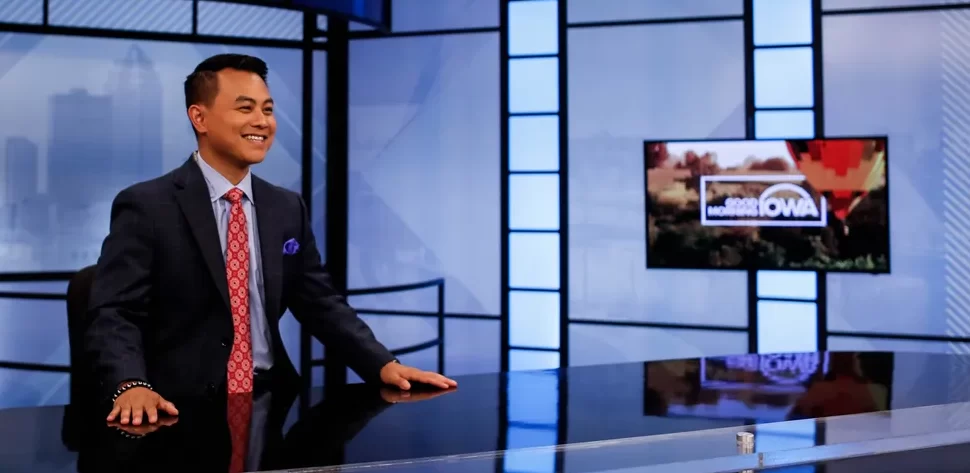 Chenue Her (pictured), known for being the country’s first Hmong anchorman, is headed to KMSP Minneapolis, where he will be a morning anchor, Michael Malone reported Sept. 23 for Broadcasting & Cable. “He starts in October and will co-anchor Fox 9 Morning from 4:30-6 a.m. with Hannah Flood. Her comes from WOI Des Moines, where he has been a morning anchor. . . .”
Chenue Her (pictured), known for being the country’s first Hmong anchorman, is headed to KMSP Minneapolis, where he will be a morning anchor, Michael Malone reported Sept. 23 for Broadcasting & Cable. “He starts in October and will co-anchor Fox 9 Morning from 4:30-6 a.m. with Hannah Flood. Her comes from WOI Des Moines, where he has been a morning anchor. . . .”
-
- “Norsan Media has expanded its presence by launching three new radio stations in Orlando focused on Hispanic audiences,” Radio Ink reported Tuesday. “The trio will bring a diversity of music genres, talk shows, cultural programming, and community events for Latino listeners in Central Florida. Norsan was already one of the Southeast’s largest Latino-focused radio broadcasters before the Orlando expansion. . . .”
-
- “California governor Gavin Newsom signed legislation banning admissions preferences for relatives of alumni and donors at both public and private universities in the state on Monday, the second law in the nation that applies to independent as well as public colleges,” Liam Knox reported Tuesday for Inside Higher Ed.
-
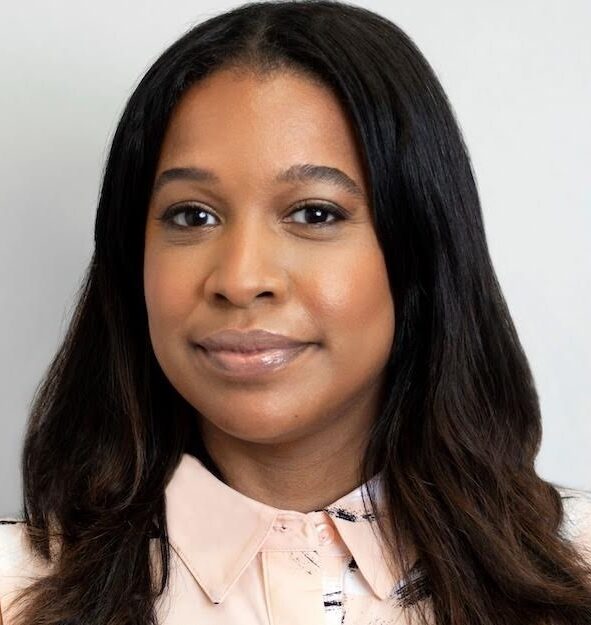 “Jada Gomez (pictured) has joined Inc. Magazine as executive managing editor,” Veronica Villafañe reported Friday for Media Moves. “In her new role at the publication, she’ll help oversee the newsroom, managing processes across the brand, collaborating with other departments. Gomez, who has a strong background in digital and print newsroom management, was most recently executive editor at Popsugar, where she managed several editorial teams focusing on audience growth, digital covers, and editorial management of the brand’s tentpole events. . . .”
“Jada Gomez (pictured) has joined Inc. Magazine as executive managing editor,” Veronica Villafañe reported Friday for Media Moves. “In her new role at the publication, she’ll help oversee the newsroom, managing processes across the brand, collaborating with other departments. Gomez, who has a strong background in digital and print newsroom management, was most recently executive editor at Popsugar, where she managed several editorial teams focusing on audience growth, digital covers, and editorial management of the brand’s tentpole events. . . .”
-
- “The remains of nine more Native American children who died at a notorious government-run boarding school in Pennsylvania over a century ago were disinterred from a small Army cemetery and returned to families, authorities said Wednesday,” the Associated Press reported. The issue resonates in Indian country. “Sugarcane,” a documentary made by two journalists, was screened this summer at the Indigenous Media Conference of the Indigenous Journalists Association. Set in Canada, the film makes personal the news stories about the trauma, even death, visited upon children forced to attend boarding schools to assimilate them into the majority culture.
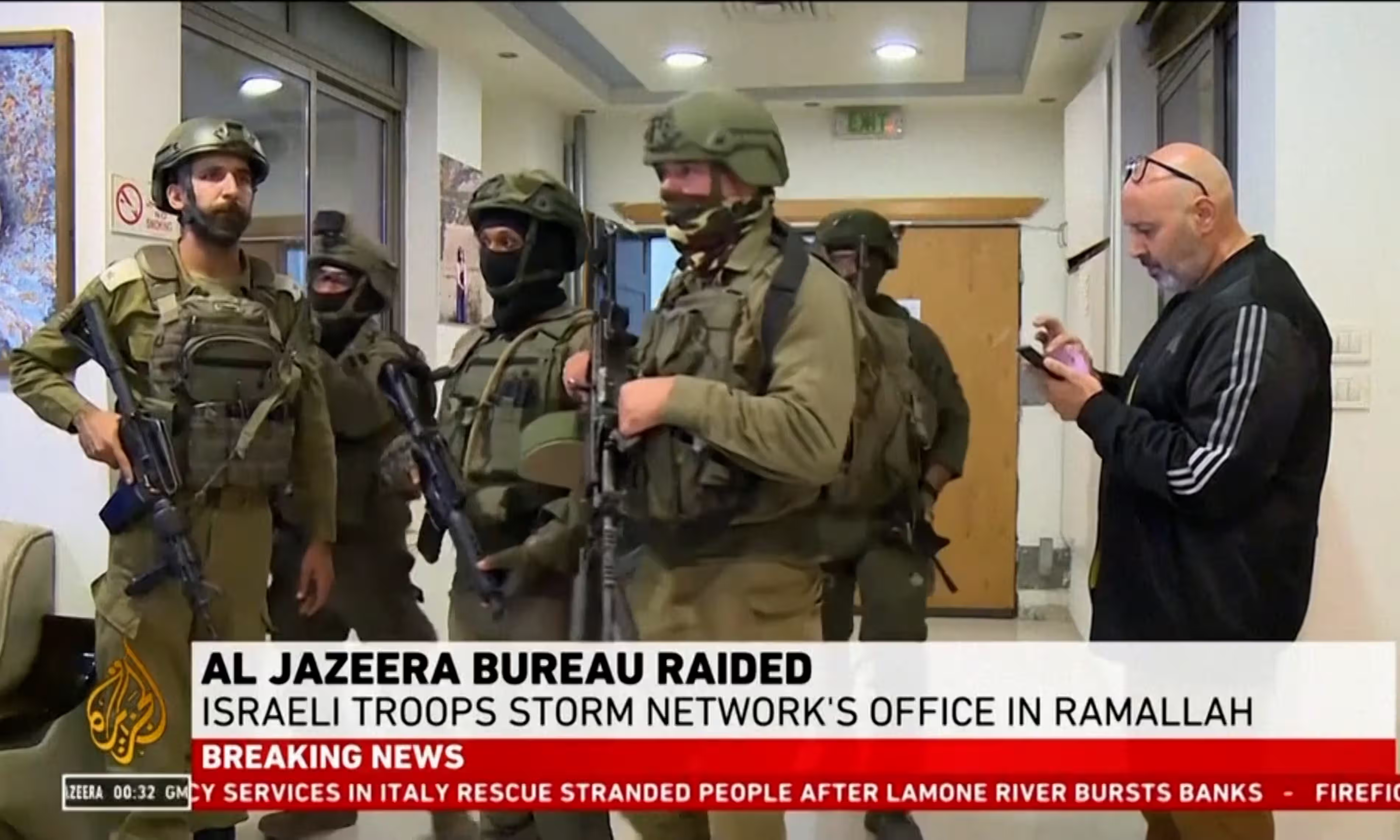
-
- “The decision to weld shut Al Jazeera’s office in Ramallah, ban its operations in Israel and restrict international media reporting from Gaza is a dire warning for all independent journalists worldwide,” Asef Hamidi, director of news for the Al Jazeera Channel, argued Sept. 26 in the Guardian. “No media organisation anywhere in the world would accept heavily armed and masked security men storming its offices. . . .” CNN earlier reported, “The Israeli military said it began enforcing the order to close the offices after an intelligence assessment concluded they were being used to ‘incite terror’ and ‘support terrorist activities.’ ”
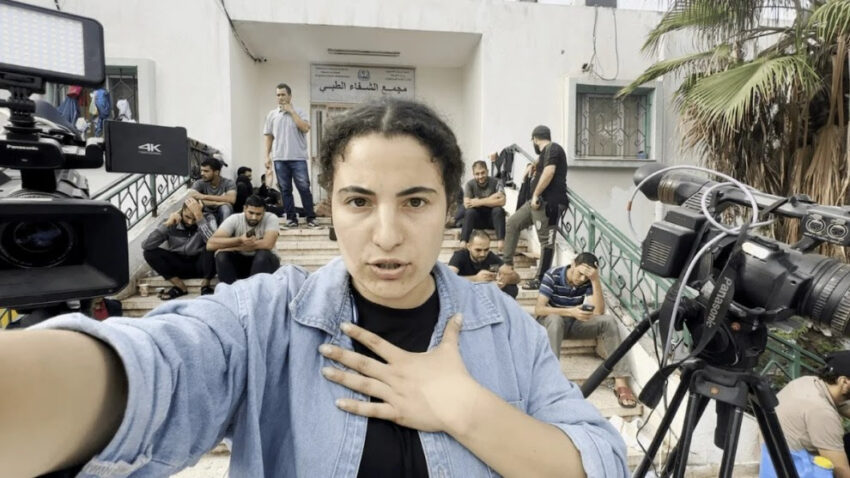
Bisan Atef Owda (Credit: “It’s Bisan from Gaza and I’m Still Alive,” via Peabody Awards)
-
- “Palestinian journalist Bisan Atef Owda has won the Emmy for Outstanding Hard News Feature: Short Form for her ongoing project ‘It’s Bisan From Gaza and I’m Still Alive.’ The win comes 5 days after a campaign to get her nomination at the 2024 News and Documentary Emmy Awards rescinded was rejected by the Television Academy,” Ross A. Lincoln reported Sept. 25 for the Wrap.
-
- “In Nicaragua, practicing independent journalism results in being discredited, persecuted, criminalized and exiled,” Katherine Pennacchio reported Sept. 23 for LatAm Journalism Review. “From 2018 to 2024, at least 54 media outlets have been shut down, and around 275 journalists have been forced into exile, according to data from the Foundation for Freedom of Expression and Democracy (FLED, for its acronym in Spanish). At least 25 journalists have been stripped of their nationality. . . .”
-
 “Cambodia this week has seen an outpouring of support from journalists, media groups and embassies for Mech Dara (pictured), one of the country’s last remaining independent journalists, who recently was taken into custody and charged with incitement,” Tommy Walker reported Thursday for the Voice of America. “He is a leading voice against human trafficking & online scams,” the U.S. Embassy posted on X, noting that he was presented with an award by U.S. Secretary of State Antony Blinken last year for his work to combat human trafficking. . . . Cambodian-state media confirmed that Dara, 36, was charged with incitement related to social media posts he made at the end of September. He is now in pre-trial detention and could face up to two years in prison for his alleged offenses. . . .”
“Cambodia this week has seen an outpouring of support from journalists, media groups and embassies for Mech Dara (pictured), one of the country’s last remaining independent journalists, who recently was taken into custody and charged with incitement,” Tommy Walker reported Thursday for the Voice of America. “He is a leading voice against human trafficking & online scams,” the U.S. Embassy posted on X, noting that he was presented with an award by U.S. Secretary of State Antony Blinken last year for his work to combat human trafficking. . . . Cambodian-state media confirmed that Dara, 36, was charged with incitement related to social media posts he made at the end of September. He is now in pre-trial detention and could face up to two years in prison for his alleged offenses. . . .”
-
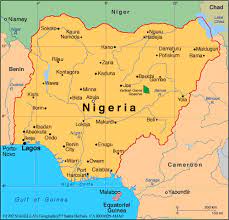 “Despite recent reforms to Nigeria’s Cybercrimes Act, journalists continue to be targeted for publishing news in the public interest, with four reporters being charged under the law last month,” the Committee to Protect Journalists reported Thursday. “On September 27, the four journalists were charged in a Lagos federal court with violating sections 24(1)(b) and 27 of the Cybercrimes Act for reporting that implicated Segun Agbaje, chief executive officer of Guaranty Trust Bank, in alleged fraud worth 1 trillion naira (US$600 million),” according to Abdulrahman Aliagan, Nigerian Guild of Investigative Journalists’ president, Kwara-based journalist Dare Akogun, and a copy of the charge sheet reviewed by CPJ. Meanwhile, “Minister of Information and National Orientation, Mohammed Idris, has said his ministry was collaborating closely with the United States government to promote and strengthen press freedom in Nigeria,” Emmanuel Elebeke reported Sept. 18 for the Vanguard.
“Despite recent reforms to Nigeria’s Cybercrimes Act, journalists continue to be targeted for publishing news in the public interest, with four reporters being charged under the law last month,” the Committee to Protect Journalists reported Thursday. “On September 27, the four journalists were charged in a Lagos federal court with violating sections 24(1)(b) and 27 of the Cybercrimes Act for reporting that implicated Segun Agbaje, chief executive officer of Guaranty Trust Bank, in alleged fraud worth 1 trillion naira (US$600 million),” according to Abdulrahman Aliagan, Nigerian Guild of Investigative Journalists’ president, Kwara-based journalist Dare Akogun, and a copy of the charge sheet reviewed by CPJ. Meanwhile, “Minister of Information and National Orientation, Mohammed Idris, has said his ministry was collaborating closely with the United States government to promote and strengthen press freedom in Nigeria,” Emmanuel Elebeke reported Sept. 18 for the Vanguard.
-
- “From the Chadian city of Mongo to the Soum province in Burkina Faso, over 500 community radio stations in the Sahel and neighbouring countries have joined Reporters Without Borders (RSF) in calling for the protection of the right to local information. This appeal was officially presented on 24 September at a press conference in the Malian capital, Bamako, and broadcast in six languages via partner radio stations,” Reporters Without Borders said.
To subscribe at no cost, please send an email to journal-isms+subscribe@groups.io and say who you are.
Facebook users: “Like” “Richard Prince’s Journal-isms” on Facebook.
Follow Richard Prince on Twitter @princeeditor
Richard Prince’s Journal-isms originates from Washington. It began in print before most of us knew what the internet was, and it would like to be referred to as a “column.” Any views expressed in the column are those of the person or organization quoted and not those of any other entity. Send tips, comments and concerns to Richard Prince at journal-isms+owner@
View previous columns (after Feb. 13, 2016).
View previous columns (before Feb. 13, 2016)
- Diversity’s Greatest Hits, 2018 (Jan. 4, 2019)
- Book Notes: Is Taking a Knee Really All That? (Dec. 20, 2018)
- Book Notes: Challenging ’45’ and Proudly Telling the Story (Dec. 18, 2018)
- Book Notes: Get Down With the Legends! (Dec. 11, 2018)
- Journalist Richard Prince w/Joe Madison (Sirius XM, April 18, 2018) (podcast)
- Richard Prince (journalist) (Wikipedia entry)
- February 2018 Podcast: Richard “Dick” Prince on the need for newsroom diversity (Gabriel Greschler, Student Press Law Center, Feb. 26, 2018)
- An advocate for diversity in the media is still pressing for representation, (Courtland Milloy, Washington Post, Nov. 28, 2017)
- Morgan Global Journalism Review: Journal-isms Journeys On (Aug. 31, 2017)
- Journal-isms’ Richard Prince Wants Your Ideas (FishbowlDC, Feb. 26, 2016)
-
Richard Prince with Charlayne Hunter-Gault, “PBS NewsHour,” “What stagnant diversity means for America’s newsrooms” (Dec. 15, 2015)
- Book Notes: Journalists Follow Their Passions
- Book Notes: Journalists Who Rocked Their World
- Book Notes: Hands Up! Read This!
- Book Notes: New Cosby Bio Looks Like a Best-Seller
- Journo-diversity advocate turns attention to Ezra Klein project (Erik Wemple, Washington Post, March 5, 2014)
